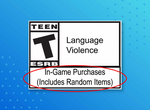
SAUER Jim
Recommendations: 0
Review: 1
Review: 1
18 Jan 2023

STAGE 1

Beneath the label: Assessing video games’ compliance with ESRB and PEGI loot box warning label industry self-regulation
How effective is self-regulation in loot box labelling?
Recommended by Chris Chambers based on reviews by Pete Etchells and Jim SauerPaid loot boxes – items bought for real-world money that offer randomised rewards – are a prevalent feature of contemporary video games (Zendle et al., 2020). Because they employ random chance to provide rewards after spending real money, loot boxes have been considered a form of gambling, raising concerns about risk of harm to children and other vulnerable users. In response, some countries have taken legal steps to regulate and even ban the use of loot boxes, with only limited success so far (Xiao, 2022). At the same time, the Entertainment Software Rating Board (ESRB) and PEGI (Pan-European Game Information) now expect games that contain loot boxes to be marked with warning labels that, in theory, will enable users (including parents) to make more informed decisions. These requirements by ESRB/PEGI are not legally binding and may be considered a form of industry self-regulation.
In the current study, Xiao (2023) will investigate the effectiveness of self-regulation in the use of loot box labels. Study 1 examines the consistency of warning labels by the ESRB and PEGI, with the expectation that if self-regulation works as it should then these labels should always (or nearly always) co-occur. Study 2 establishes the compliance rate for labelling among popular games that are known to contain loot boxes, with a rate of ≥95% considered to be successful. The findings should prove useful in identifying the success or failure of self-regulation as a means of ensuring industry compliance with loot box labelling.
The Stage 1 manuscript was evaluated over two rounds of in-depth review. Based on detailed responses to the reviewers' comments, the recommender judged that the manuscript met the Stage 1 criteria and therefore awarded in-principle acceptance (IPA).
URL to the preregistered Stage 1 protocol: https://osf.io/e6qbm
URL to the preregistered Stage 1 protocol: https://osf.io/e6qbm
Level of bias control achieved: Level 3. At least some data/evidence that will be used to the answer the research question has been previously accessed by the authors (e.g. downloaded or otherwise received), but the authors certify that they have not yet observed ANY part of the data/evidence.
List of eligible PCI RR-friendly journals:
List of eligible PCI RR-friendly journals:
- Addiction Research & Theory
- F1000Research
- Peer Community Journal
- PeerJ
- Royal Society Open Science
- Swiss Psychology Open
- WiderScreen
References
1. Zendle, D., Meyer, R., Cairns, P., Waters, S., & Ballou, N. (2020). The prevalence of loot boxes in mobile and desktop games. Addiction, 115(9), 1768-1772. https://doi.org/10.1111/add.14973
2. Xiao, L. Y. (2022). Breaking Ban: Belgium’s ineffective gambling law regulation of video game loot boxes. Stage 2 Registered Report, acceptance of Version 2 by Peer Community in Registered Reports. https://doi.org/10.31219/osf.io/hnd7w
3. Xiao, L. Y. (2023). Beneath the label: Assessing video games’ compliance with ESRB and PEGI loot box warning label industry self-regulation, in principle acceptance of Version 3 by Peer Community in Registered Reports. https://osf.io/e6qbm